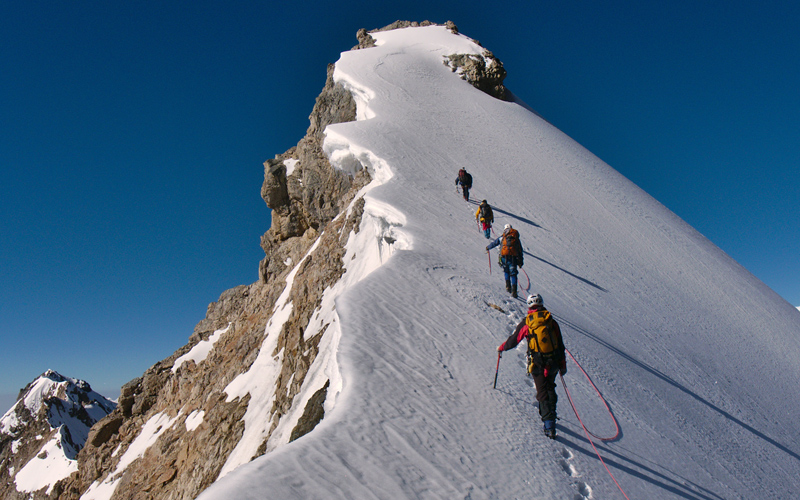We've been in a series of messages focusing on the interim season as a church looks for a minister. We've used the imagery of mountain climbing to help us visualize the challenges and opportunities of this task. (See links below for other messages.).
During this interim season, we identify getting the new preacher to our church as our primary task. Finding this new preacher is the key mountain that we must climb. Climbing Mount Everest shouldn't be the first high altitude expedition for any climber. Similarly, a church must go on preparatory expeditions and climb other peaks before it is prepared to effectively summit our targeted mountain of finding a minister. Unfortunately many search efforts end up in only short-term success because the church forgets to go on these important, but often neglected expeditions.
|
"For the Son of Man came to seek and to save the lost" (Luke 19:10 - Jesus).
|
While we rightfully focus on the love and grace of God in Jesus' coming to earth, we sometimes forget that Jesus came on a mission. We often abridge the most famous statement of the Bible about why Jesus came, leaving out the mission statement for his coming - see the underlined portion in the passage that follows:
For God so loved the world that he gave his one and only Son, that whoever believes in him shall not perish but have eternal life. For God did not send his Son into the world to condemn the world, but to save the world through him (John 3:16-17 - underline added for emphasis).
Jesus' ministry is full of essential teaching and compassionate care. These are primary expeditions that ultimately lead him to the cross, the tomb, and the resurrection. But, an often-neglected focus for us is Jesus' clear sense of mission that animated and empowered all the other expeditions of his ministry.
|
"Let us go somewhere else - to the nearby villages - so I can preach there also. That is why I have come" (Mark 1:38 - Jesus).
|
Take a minute and look at the special mission statements of Jesus highlighted in the call out windows in this post - one from each of the four gospels. Jesus vocalized these to his apostles so that they would know that at the heart of what they did was a sense of both universal and specific mission.
When we share in the Lord's Supper, we remember and declare the things that Jesus did for us in anticipation of his coming again (1 Corinthians 11:23-26). Unfortunately, we can forget that as we share in the bread together, we are the bodily presence of Jesus in the world today (1 Corinthians 10:16-17). Paul emphasizes the moral implications of being a part of Jesus' body. We need also to recognize the missional component as well. We, the people who share in this meal, are the body of Christ in the world today. We are sent to do what he would do in the world (John 20:21; Luke 19:10).

One of the most valuable opportunities of the interim season for a congregation is to reawaken to its mission. This means reawakening to the universal mission Jesus has for every congregation (Matthew 28:18-20). It also means re-examining and embracing the specific mission for that congregation has based on its location in place and time along with the spiritually gifted people the Lord has assembled to make up that church.
|
"All authority in heaven and on earth has been given to me. Therefore go and make disciples of all nations, baptizing them in the name of the Father and of the Son and of the Holy Spirit, and teaching them to obey everything I have commanded you. And surely I am with you always, to the very end of the age" (Matthew 28:18-20 - Jesus).
|
The book of Revelation (chapters 2 and 3) reminds us that even congregations in near each other can have quite different specific missions. The New Testament alerts us to the different needs, challenges, and missions of specific congregations. Letters to specific congregations make up a huge chunk of our New Testament. Each of those specific situations needed to be addressed in specific ways with a focus on a specific mission for its role in the community and the world around it.
Unfortunately, a church wanting to find a preacher looks for a charismatic and energetic speaker without thinking about its specific mission or the minister's mission focus for his ministry. When the new preacher's honeymoon is over, conflict can occur because of this disconnect between the minister's sense of missional calling and the congregation's sense of mission to its community and the world.
Examining a congregation's mission is often the neglected expedition of the interim season. A church in the interim season needs to ask questions related to its congregational missional calling? Here are just a few of the questions a congregation should ask:
- What would our neighborhood and city lack if we were not here?
- What can we do best to bring the influence of God's Kingdom to our neighborhood, our city, and our world?
- How are our people uniquely equipped through experience and spiritual gifts to bring the grace of God to people around us?
- How is our mission different from churches X, Y, and Z that are near us?
- What are areas that our city and neighborhood most need help in addressing that God has called us to bring his grace to bear?
- How can we best be Jesus and bring his character and compassion to those around us?
Clearly, there is a host of other questions that are pertinent to help us go on the needed expedition to re-awaken our congregation to clarify what our specific mission is to our neighbors. All sorts of city and community organizations are willing to offer input to a church. A congregation can gather information on community needs from the Chamber of Commerce, Police Department, Child Protective Services, school principals and district superintendent, mayor, council members, and city department heads.
|
"My food," said Jesus, "is to do the will of him who sent me and to finish his work. Don't you have a saying, 'It's still four months until harvest'? I tell you, open your eyes and look at the fields! They are ripe for harvest" (John 4:34-35).
|
As we clarify what our specific mission is as a congregation, then we know much more clearly the missional focus of the minister we need to call. This better prepares us for the ultimate decision on finding that minister who will come and partner with us in our mission. The big mountain we seek to summit - finding a new minister - holds our attention and fascination. However, we must forget the often-neglected expedition: clarifying our mission and vision.

Final Reminders from the disasters on Mount Everest
People die on Everest for a lot of reasons - earthquakes, weather, altitude sickness, and avalanches, for example. Unfortunately, however, many are put in jeopardy by a lack of preparation on other mountains and because of their obsession with the one summit they want to reach - the tallest of mountains. We do not want to be guilty of the same neglect as we search for a minister to partner with us in the mission of God!
Thus, Everest has become just as famous for its "circus" as its adventure. ... Outfitters still sell tickets to the top to inexperienced clients who don't know how to put on crampons.
... "We haven't guided on Everest in a while," says Mark Gunlogson, who heads Mountain Madness, an outfitter based in Seattle. "It's getting to be a little bit out of control. Too many people, too many people who are not qualified to be on the mountain. We've pulled back a bit."
... In the quake's aftermath, Tenzing says that many Sherpas are reconsidering whether to resume climbing next spring.
"They're wondering, should they become guides and go on smaller mountains?" Tenzing says. "People will continue to climb Everest. The average Sherpa has to reconsider whether he wants to go back or not."
Yet the mountain still beckons. The chance to stand at 29,035 feet works against changing the equation of how Everest is climbed, says Roberts.
It's that way almost everywhere. "Mount Whitney is the highest peak in California," he says. "It's absolutely swarmed."
A bit farther north lies a lovely peak, North Palisade. It's a prettier journey, Roberts says. "No one climbs that. It's 248 feet lower."
(Quoted from "Will Everest's Climbing Circus Slow Down After Disasters?" from nationalgeographic.com.)












Comments
Have thoughts on this article? Leave a comment